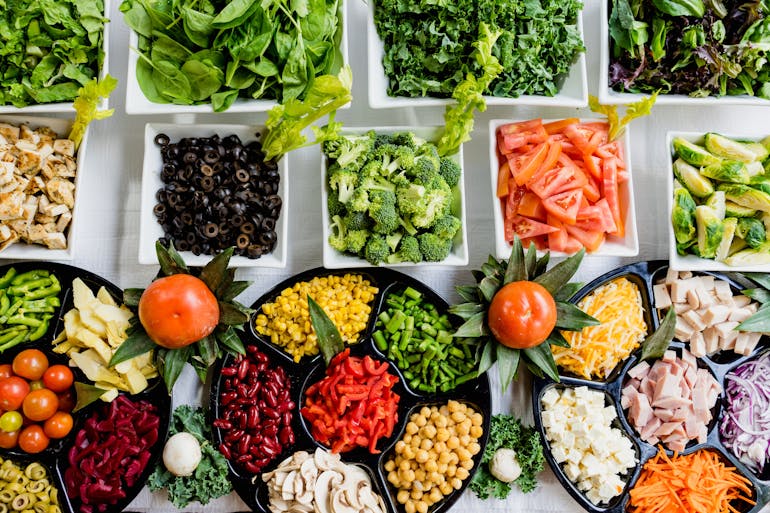7 ways to boost your immune system with healthy food
Reviewed and fact-checked by Giulia Guerrini, Superintendent Pharmacist. Read our editorial policy to see how we create informative, accurate content.
The environmental change between the seasons influences the immune system, in fact, between autumn and winter there are constant changes in temperatures, houses are kept closed and the use of heating (dry air) increases.
In addition to this, there is the use of public transport and constant contact with commonly used surfaces such as doorknobs, all this increases exposure to germs, especially viruses, which are responsible for the common cold, flu, and seasonal respiratory infections.
How can you strengthen your immune system?
Our immune system is always ready for action, even if we don't even notice it most of the time. Defence cells are always activated to come quickly when pathogenic germs enter the body. To function optimally, the immune system depends on the support provided by food:
- Micronutrients
- Flavonoids and Carotenoids
- Probiotics for intestinal health
A balanced diet with a high density of nutrients, especially in times of great stress, can help prevent disease.
7 Ways To Boost Your Immune System With Healthy Food
1. Vitamin C: Foods Rich In Vitamin C
Vitamins are only obtained through food and through vitamin supplements, so it is important to eat foods with the highest content of vitamins that enhance the immune system, one of them is vitamin C.
Vitamin C is undoubtedly the best-known vitamin with a stimulating effect on the immune system. In fact, it has been shown to protect the body against infections, especially in stressful situations and in difficult conditions (for example, extreme climates). (1)
Vitamin C: foods high in content
- Papaya (235mg in one large papaya)
- Parsley (133mg in 100g of parsley)
- Red pepper (190mg in a medium red pepper)
- Cabbage (36.6mg in 100g of cabbage)
- Broccoli (90mg in 100g of broccoli)
- Kiwi (92mg in 100g of kiwis)
- Orange (53mg in 100g of oranges)
2. Vitamin D: Sun For The Immune System
A sufficient supply of vitamin D is especially important in the cold season because the so-called sunshine vitamin contributes decisively to the functionality of the immune system. The body can produce vitamin D in relevant quantities by exposing the skin to the sun, but in winter this is quite difficult.
To ensure good levels of vitamin D, frequent consumption of foods such as:
- Fish rich in essential fatty acids such as salmon, tuna, and mackerel
- Dairy Fortified With Vitamin D
- Eggs and Liver
It is also advisable to fill your vitamin D stores during the summer months. For this, it is not necessary to sunbathe too much: just 15 minutes of sun exposure on a quarter of the body is enough (2), but don’t forget to apply sunscreen.
3. B Vitamins: The Complex for Strong Cells
The immune system benefits from a good supply of B complex vitamins. Vitamins B6, B12, and B9 (better known as folates) have a direct positive effect on the immune system. Basically, vitamin B12 requirements can only be met through foods of animal origin (3), so if you are vegetarian, vegan or don’t eat too much meat and dairy, it is highly recommended to take a B12 supplement.
Vitamin B6: foods high in content
- Potatoes (0.3mg in 100g of potatoes)
- Banana (0.4mg in 100g of bananas)
- Spinach (0.1mg in half a cup of spinach)
Vitamin B9 (folate): food with high content
- Chickpeas (170mcg in 100g of chickpeas)
- Red beans (131mcg in 1 cup of red beans)
- Spinach (100mcg in 1 cup of spinach)
- Kale (263mcg in 1 cup of kale)
- Brussels sprouts (94mcg in a 1 cup of brussel sprouts)
When preparing foods rich in vitamin B, it is important to ensure that they are not heated or boiled for a long time (longer than necessary for cooking) because these nutrients are sensitive to heat and are reduced by heating, boiling, and frying the food or storing them for a long time.
4. Iron And Zinc: The Immune Duo Between Trace Elements
Trace elements such as iron and zinc are among the most important minerals for the immune system. Iron is essential for the growth and reproduction of cells in the body.
Zinc is a component of many important enzymes in the body and is involved in the growth, division, and specialization of cells. The immune system in particular benefits from zinc, and the body cannot store it for long, therefore zinc deficiency leads to a reduction in the body's defence actions. (4)
Several studies have shown that zinc greatly reduces the duration of a cold and the severity of its symptoms, this trace mineral also reduces cold symptoms such as tiredness, headache, body aches, or sore throat
Zinc: foods with high content
- Pumpkin seeds (8mg in 100g of pumpkin seeds)
- Oysters (32mg in 6 oysters)
- Oatmeal (2.95mg in 1 cup of oats)
Iron: high-content foods
- Pumpkin seeds (3.3mg in 100g of pumpkin seeds)
- Pseudograins (Amaranth, Quinoa) (2.8mg in 1 cup of quinoa)
- Pistachios (3.9mg in 100g of pistachios)
- Chickpeas (6.2mg in 100g of chickpeas)
- Raw Spinach (2.7mg in 100g of spinach)
- Fennel (0.7mg in 100g of fennel)
The bioavailability of iron increases if foods containing vitamin C are eaten at the same time or if orange or lemon juice is drunk since vitamin C favors the absorption of iron.
5. Selenium: Stimulation For The Defence Of The Organism
Selenium stimulates the production of antibodies. The activity of phagocytes of the immune system is also stimulated by selenium, it also has an antiviral effect. During a cold and to strengthen the immune system, 100 to 200 micrograms per day are recommended. (5)
Selenium rich foods
- Crabs and oysters (116mcg in 75g of crab)
- Brazil nuts (68-91mcg per nut)
- Cod (23-38mcg in 100g of cod)
6. Flavonoids And Carotenoids: Natural Defence Substances
Secondary plant substances such as flavonoids and carotenoids provide protective properties to the cells of the body, one of their best-known properties is the antioxidant effect, this acts by protecting the cells from oxidative stress produced by free radicals, other important effects of flavonoids and carotenoids are:
- Anti-inflammatory
- Immunomodulators
- Antiviral and antifungal
- Anticancer
Flavonoids are among the secondary plant substances with the broadest activity profile and the greatest positive influence on the immune system. Some foods high in flavonoids are: (6)
- Apples
- Pears
- Onions
- Cherries
- Tomatoes
- Black and green tea
7. Probiotics: Care For The Immune System In The Intestine
In the intestinal flora, the germs that directly invade are not only fought locally with the help of the good intestinal bacteria, there are also more than 70% of the immune cells of the body's defence system in the digestive tract. Gut bacteria play a central role: they communicate with immune cells and help them differentiate between good and bad cells in the body.
A nutrient-poor, unhealthy diet, chronic stress, nicotine, and alcohol or antibiotics all have a negative effect on the entire immune system.
By taking care of the health of the intestines, you are also taking care of the immune system, one way to do this is by supplying probiotics through diet. Good bacteria settle in the intestine and multiply there, which benefits the intestinal flora. You can also supplement your diet with prebiotics, as they serve the good intestinal bacteria as appropriate food. (7)
Probiotic foods
- Yogurt made with animal or vegetable milk (natural, not pasteurized)
- Kefir
- Sauerkraut (raw, because bacteria are lost when cooking)
- Fermented vegetables (fermented with lactic acid, without adding vinegar)
- Kimchi
- Tepache (fermented pineapple drink)
Prebiotic foods
- Chicory
- artichokes
- Onions and leeks
- Garlic
- Bananas
References
- PubMed Central (PMC) - Vitamin C and Immune Function
- PubMed Central (PMC) - Vitamin D and the Immune System
- PubMed Central (PMC) - B Vitamins and the Brain: Mechanisms, Dose and Efficacy—A Review
- PubMed Central (PMC) - Zinc in Human Health: Effect of Zinc on Immune Cells
- PubMed Central (PMC) - The Role of Selenium in Inflammation and Immunity: From Molecular Mechanisms to Therapeutic Opportunities
- PubMed Central (PMC) - Flavonoids: an overview
- PubMed Central (PMC) - Probiotics and immune health

